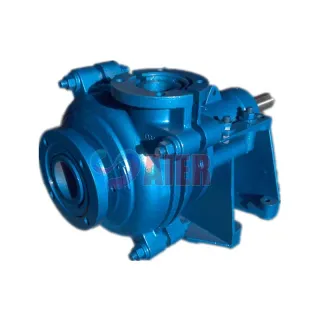Nov . 01, 2024 04:33 Back to list
Choosing the Right Manufacturer for Slurry Pump Impeller Design and Quality
The Role of Impellers in Slurry Pump Performance
Slurry pumps are integral components in various industries, responsible for transferring mixtures of liquid and solid materials. A crucial part of these pumps is the impeller, which plays a significant role in determining the efficiency, durability, and overall effectiveness of the pump. The design and material of the impeller are essential considerations for slurry pump manufacturers, as they directly affect the pump's performance in handling abrasive and viscous fluids.
Importance of Impeller Design
The impeller is the rotating component within a slurry pump that imparts kinetic energy to the slurry, allowing it to flow through the system. Manufacturers must carefully design the impeller to optimize fluid dynamics while minimizing wear and tear. Common designs include open, semi-open, and closed impellers, each suited for specific applications. For example, open impellers are ideal for handling larger particulates, while closed impellers provide higher efficiency and better pressure generation.
Material Considerations
Given that slurry often contains abrasive particles, the choice of material for the impeller is critical. Manufacturers typically use high-chrome alloys, rubber linings, or polyurethane composites to enhance resistance to wear and corrosion. The goal is to ensure that the impeller can withstand harsh operating conditions while maintaining its structural integrity. This is especially important in industries such as mining, wastewater treatment, and chemical processing, where the slurry's composition can vary widely.
impeller of slurry pump manufacturer

Performance Metrics
When evaluating slurry pump manufacturers, several performance metrics should be considered related to impeller design. These include wear life, efficiency, and the ability to maintain consistent flow rates under varying conditions. A well-designed impeller can significantly reduce downtime and maintenance costs, thus improving the overall operational efficiency of the pumping system.
Customization and Innovation
Leading slurry pump manufacturers understand that one size does not fit all. Customization is often required to meet specific industry needs or to address unique slurry characteristics. Advanced design software and simulation techniques enable manufacturers to innovate and create tailored impellers that enhance pump performance. This adaptability is vital in an ever-evolving industry landscape where operational demands frequently change.
Conclusion
In summary, the impeller of a slurry pump is a key component that influences its efficiency, durability, and overall effectiveness. By focusing on innovative designs and choosing the right materials, slurry pump manufacturers can develop products that meet the demanding requirements of various industries. As technology advances, the future of slurry pump design, particularly concerning impellers, looks promising, with potential improvements in performance and longevity on the horizon. Understanding the significance of the impeller is essential for anyone looking to optimize slurry pump operations effectively.
-
Wholesale Casting Dredge Pump Part - High Quality China Manufacturers & Suppliers
NewsJul.04,2025
-
High Quality Slurry Pump Seals Reliable China Suppliers & Manufacturers
NewsJun.24,2025
-
High Quality Portable Submersible Slurry Pump Supplier & Manufacturer from China
NewsJun.10,2025
-
Slurry Pump Parts Manufacturer – High Quality Rubber Spare Parts from China
NewsJun.10,2025
-
High Quality 1/3 HP Submersible Sump Pump with Vertical - Reliable Supplier & Factory Price
NewsJun.10,2025
-
High-Efficiency Centrifugal Slurry Pumps India
NewsJun.10,2025
